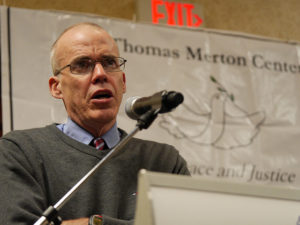Canada’s Nicer, More Radical Bill McKibben
The United States’ neighbor to the north is having a serious conversation about the promises of never-ending “green growth.” Andrew Nikiforuk / Photo: University of VIctoria
This is Part of the "Green-Tinted Glasses" Dig series
Andrew Nikiforuk / Photo: University of VIctoria
This is Part of the "Green-Tinted Glasses" Dig series
This post is part of “Green Tinted Glasses,” a Dig series curated by Christopher Ketcham that explores the limits of the renewable energy transition, the possibility that a major downshift in consumption is looming, and the implications for human progress and flourishing.
Andrew Nikiforuk, an award-winning Canadian journalist, has spent much of his career investigating the crimes and follies of the oil and gas industry, in particular the noxious environmental and social consequences of the tar sands boom in Alberta. Think of him as a modest Canadian version of Bill McKibben without the money, celebrity, corporate partnerships, or New Yorker sinecure.
Like McKibben, Nikiforuk has spoken with a clarion voice about the suicidal trajectory of continued dependence on fossil fuels.
Unlike McKibben, however, he hasn’t bought into renewable energy claims that we can continue business-as-usual growthism of economies and populations with a simple swapping out of coal, oil and gas for solar, wind, and hydro. He explains why in his latest pieces for The Tyee, a Canadian online magazine that I consider one of the most trusted sources for environmental news in North America. The piece takes a deep and critical look at the allegedly clean green industrial system that’s supposed to replace poison-spewing extractivist fossil fuels.
Writes Nikiforuk:
For largely ideological reasons many greens and “transitionists” have presented the transition to renewables as a smooth road with no potholes.
In so doing they have ignored much basic geology, energy physics and even geopolitics. As a consequence, many imagine the construction of millions of batteries, wind mills, solar panels, transmission lines and associated technologies, but they downplay the required intensification of mining for copper, nickel, cobalt and rare minerals you’ve probably never heard of such as dysprosium and neodymium.
One of the great lies of modern technological society is that of endless mineral abundance. Urban consumers who have little knowledge of energy realities underpinning their existence have swallowed the idea that digital gadgets and automation will somehow detach society from the physical world and allow us to do more with less, leading to a dematerialization of society.
Read Nikiforuk’s takedown of the ideology of growth here.
Your support matters…Independent journalism is under threat and overshadowed by heavily funded mainstream media.
You can help level the playing field. Become a member.
Your tax-deductible contribution keeps us digging beneath the headlines to give you thought-provoking, investigative reporting and analysis that unearths what's really happening- without compromise.
Give today to support our courageous, independent journalists.






You need to be a supporter to comment.
There are currently no responses to this article.
Be the first to respond.